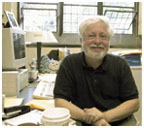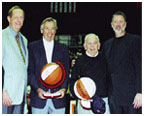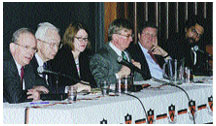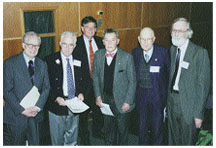|
March 21, 2001: Notebook Faculty File: Kipling and kids Eating clubs gain members: Fifteen inebriated students sent to hospital Bringing 'em back: Alumni Day draws crowds with lectures, awards, special events Princeton celebrates 100 years of basketball Madison Medalists address public policy issues Panelists look at future of higher education James Madison and the Constitution
Knoepflmacher loves those
stories, which in essence are fabulist accounts of how the world
came into being, and is working on an annotated edition of them.
"Kipling is a great artist," he says, "and his art
is an art of transformation." Kipling was born in India,
and when he was six was sent to England to be educated. Knoepflmacher
was born in Germany, and when he was seven moved with his family
to Bolivia. While acknowledging that Kipling's boyhood was far worse
than his - Kipling endured beatings and humiliations from the family
he lived with as a child - Knoepflmacher understands Kipling's exile
point of view. "Kipling's works are often fables of assimilation
and adaptation. He speaks to the refugee child that I feel I still
am, despite my old age and white hairs," says Knoepflmacher. This spring, Knoepflmacher
is teaching Children's Literature. In addition to the Just So Stories,
students will read Little Women (Alcott), The Wizard of Oz (Baum),
A Wonder Book for Girls and Boys (Hawthorne), Dear Mili (Sendak),
and Treasure Island (Stevenson). Knoepflmacher also holds
seminars in Princeton's Teacher Preparation Program. This year he
taught Kipling as part of a series called Teachers as Scholars.
"I love teaching adults," says Knoepflmacher, adding that
he derives great pleasure in opening up the world of Kipling to
other teachers. By L.O. Eating
clubs gain members Spring bicker and sign-ins
week ended February 12 with unforeseen results this year, both in
terms of numbers and inebriations. A total of 964 students
— approximately 84 percent of the sophomore class — joined
an eating club. This number is up from last year, when 932 students
joined clubs, and the previous year, when 800 students joined. The
increase comes as a surprise to both the clubs and the university,
which had expected a decline due to more dining options at the new
Frist Campus Center. An increase in club membership
was not the only surprise in store for this year’s bicker/sign-ins
process. A record number of students were hospitalized for severe
intoxication and alcohol-related injuries during the following weekend,
as bicker clubs did “pick-ups” and sign-in clubs held
initiations. Eleven students were taken to McCosh Health Center,
three to Princeton Medical Center, and one to Capital Health System
in Trenton. In total, 15 students were treated over the weekend
— five more than the number of students treated after the last
(and most dangerous) Nude Olympics. Because a number of those
hospitalized were under 21, the Princeton Borough Police are conducting
an investigation of the weekend’s events. Charges may ultimately
be brought against those who served the minors alcohol, said Borough
Police Captain Charles Davall. University administrators
have also expressed concern over the policies and procedures of
the eating clubs. “Alcohol incidents have increased throughout
the year, but it dramatically hit home [initiations] weekend,”
said Director of McCosh Health Services Pamela Bowen. “Things
need to happen in a different way in terms of club policy and university
policy. We need to take a more serious look at what’s going
on.” By Andrew Shtulman ’01 In the evening of February
16, visitors to the Art Museum were greeted not with a characterisitc
silence, but with the syncopated sounds of jazz. The Ellipsis Jazz Project,
a four-person student jazz ensemble, played in the Sterling Morton,
Class of 1906 Gallery as part of the museum’s Jazz Night, a
bimonthly event in which attendees can move to the music, munch
hors d’oeuvres, and meander through the galleries. Docents
were on hand for those who had questions about the art. The idea of Director
Susan Taylor, Jazz Night was designed as a way of drawing more students
into the museum. And it’s worked. “We typically get up
to 150 people at these events,” said Patti Lang, coordinator
of volunteers at the museum. “Many of them are graduate students,
though we do see a fair number of undergraduates.” Heather Russo ’04
was one of approximately 50 undergraduates at the February event.
“I saw Jazz Night advertised in the USG’s weekly e-mail,
and it looked like fun,” she said. “It’s definitely
a different kind of activity from what’s usually offered on
the Princeton campus.” By Andrew Shtulman ’01 Bringing
'em back Princeton’s annual
Alumni Day has been billed as “Princeton at its best,”
and the description fitted the 2001 edition, held Saturday, February
24. There were the graduate student Jacobus prize winners, both
of whom have already published prize-winning research. There was
the undergraduate Pyne Prize winner, a molecular biology major who
spoke of the importance of the performing arts. There was coming
face-to-face with conservative thinker George Will *68 at a reception
and spying liberal thinker Cornel West *80 across the room. There
were the two alumni medal winners, Lloyd Axworthy *72, architect
of the Ottawa Treaty against landmines, and Stapleton Roy ’56,
former ambassador to Singapore, China, and Indonesia. And there
were President Harold Shapiro’s thoughtful closing remarks,
in which he spoke of the search for greater meaning in our lives
and the pride he takes in Princeton’s commitment to the life
of the mind. The Alumni Day celebration,
which drew an estimated 1,300 people to campus, actually kicked
off the previous day with a conference on James Madison sponsored
by the Graduate School (see page 13) and a student-organized national
bioethics conference on reproductive technology (see story in PAW’s
next issue, April 4). Other talks included
Elizabeth Bogan p’96, lecturer in economics, on economics and
public policy; Richard Golden *54, associate dean for operations
and research in the engineering school, on the environment; English
department chair Michael Wood on Shakespeare and film; Caryl Emerson,
professor of Slavic languages, on Dostoevsky and Tolstoy; Robert
Goldston *77, director of the Plasma Physics Laboratory, on fusion;
and Daniel Rubenstein, chair of the department of ecology and evolutionary
Like last year, there
was also an emphasis on family-oriented events, such as a play for
all ages in the Cotsen Children’s Library, a seminar on college
admission by Nick Allard ’74, and an Art Museum lecture tailored
for elementary-school kids. A number of families
with children took a break from the sanctioned schedule to listen
to a Firestone Plaza protest sponsored by WROC, the Workers Rights
Organizing Committee, a student-led group rallying for Princeton’s
lowest-paid workers. At the awards luncheon,
President Shapiro introduced the winners of the Jacobus Fellowship:
Kristine Haugen, an English student who reads nearly a dozen languages,
is working with a team of seven advisers from a variety of disciplines
on her dissertation on late 17th-century scholar Richard Bentley;
and chemical engineer Yueh-Lin Loo, who was born in Malaysia and
raised in Taiwan, was cited by Shapiro for her achievements and
academic record in the area of polymer crystallization. Shapiro next introduced
M. Taylor Pyne Prize winner Adam Friedman ’01, a molecular
biology major whose senior thesis is on the regulation of a molecular
pathway known as the Notch pathway. Friedman, who is also an actor
and a founding member of the Performing Arts Council, spoke of the
importance of theater and the arts, and his comment that he hoped
someday the term “scholar athlete” would be used in equal
measure with “scholar artist” received a spontaneous burst
of applause. Lloyd Axworthy, winner
of the James Madison Medal for graduate alumni, spoke of his work
in human rights, which he said was fostered by his time at Princeton
in the late 1960s. “There was a strong spirit that we were
endowed with a responsibility to make things better,” he said. The Woodrow Wilson award
for undergraduate alumni went to Roy, who recently received the
U.S. government’s highest diplomatic honor of “career
ambassador.” Roy joked that he was grateful to Woodrow Wilson
for steering him away from politics and into foreign service: “Graduates
of Harvard or Yale,” he said, “can be elected to the presidency
on a somewhat random basis, but it’s only every 104 years that
a Princetonian is in the White House.” By J.C.M.
Princeton celebrates 100 years of basketball
At half-time of the men’s
basketball team’s Alumni Day victory against Dartmouth on February
24, Princeton celebrated the 100th anniversary of its intercollegiate
basketball program. Seventy-four former players and coaches, including,
from left, Bill Bradley ’65, Butch van Breda Kolff ’45,
Pete Carril, and Geoff Petrie ’70, assembled on the Jadwin
Gymnasium floor during the ceremony.
Woodrow
Wilson Award winner urges collegiality among nations
Contrasts, both amusing
and serious, highlighted Woodrow Wilson Award winner J. Stapleton
Roy ’56’s Alumni Day address, “Diplomatic Diversions:
Reflections on the U.S. Place in the World.” Roy, whose more than
40 years in foreign service included posts in Russia, China, and
Indonesia, entertainingly outlined mundane tasks, such as handing
out visas, and exciting ones, like skiing above the Arctic Circle,
then homed in on his message: America’s principles and national
self-interests must not contradict each other. Additionally, he said,
we often ignore the instability caused in the transfer of authority
to a more democratic form of government, rather than helping build
a system of checks and balances that will ultimately do more for
promoting human rights. Currently managing director
of Kissinger Associates, a consulting firm founded by former Secretary
of State Henry Kissinger, Roy said our country’s behavior is
tied to our history. Our own shortcomings in areas such as slavery
and women’s suffrage, our simplistic language, such as when
we equate policies in Beijing with those of Baghdad, and our aggressiveness
— suitable Cold War strategy but not suited to the current
world scene —work against us. To counter this, Roy suggested
a more collegial style of U.S. leadership; a more sophisticated
rhetoric and public discourse; and less distorted and superficial
global awareness through the media. “Defeating enemies
is one thing, but working with imperfect nations is another. The
world is a more fluid community now. People in all civil societies
should search for what is in common with other civil societies,”
Roy urged. Madison
Medalist sees national security
Nations and universities
must agree on a new definition of security — one that crosses
global boundaries for the protection of all — argued Madison
Medal winner N. Lloyd Axworthy *72 on Alumni Day. In “An Encounter
with Emma: The Case for Rethinking Security and State Sovereignty
in the New Century,” the former Canadian cabinet minister,
who recently returned to academia at the University of British Columbia’s
Liu Centre for the Study of Global Issues, suggested that the threat
to nations today comes not from the possibility of traditional war,
but from conflicts that exact a greater price from civilians than
from soldiers. Axworthy met Emma and
listened to her story at a recent Canadian conference on war-affected
children. She was a child soldier from northern Uganda — abducted
from her village at 9, made a bride-slave, then a mother at 11,
and a warrior soon after she proved herself by murdering one of
her own relatives. “Emma has already lived a life five times
more extreme than any of us can imagine. This is also our world,
a world we cannot be indifferent to, a global reality and one that
carries impact for ourselves and our children,” Axworthy said. Axworthy, who brokered
an international ban on landmines and supports an international
criminal court, suggested, “We can no longer ignore the street,”
citing examples such as refugee camps in Afghanistan which breed
further violence and international crime rings that develop sweatshops.
“These are as much a security risk as an AK rifle.” A redefinition of the
nation-state, one that sees “national security and human security
as two sides of the same coin,” is what’s needed, Axworthy
said, but he admitted that the model to do this hasn’t been
found. He urged policymakers and academics to team up for this purpose,
and for academics to be willing to go where the action is in training
a new generation for the task: “Universities can often go where
governments can’t.”
By Maria LoBiondo Madison Medalists address public policy issues
Five Madison medalists,
including this year’s awardee, Lloyd Axworthy *72, talked about
the most pressing public policy issues facing the U.S. today, from
genetic engineering to national security, on February 24 in McCosh
50. Responding in part to
Will’s remarks, Cornel R. West *80, a professor of Afro-American
studies at Harvard, warned against neglecting to look at the underbelly
of our nation in moments of relative prosperity. “If we look
at American society through the lens of its children, it looks very
different,” said West. The question, he said, “is how
do we keep track of the underside of the surfaces.” The other panelists addressed
the U.S.’s engagement in the world. Axworthy, until last fall
Canada’s minister of foreign affairs, urged the U.S. to begin
to look at its place as a North American country. Anthony K. Lake
*74, former national security adviser to President Clinton and now
a professor at Georgetown University, expressed concerns with our
national security. The greatest threats, he said, are not other
nations’ strengths such as armies and spies, but our own “weaknesses
and weaknesses around the world.” Andrew J. Goodpaster *50,
former supreme allied commander in Europe, warned that the U.S.
“must be discriminating” in its engagement in conflicts
and military forces should be used as a “means of the last
resort.” During a question-and-answer period with the audience,
Lake also described the implications of the biological revolution
on the horizon as a result of genetic engineering. That revolution
will enlarge the gap between rich and poor people and nations, he
said. With all these challenges
facing the world, one man in the audience asked, is our education
system up to the task of dealing with them? “I don’t think
so,” said Axworthy. Scholars, he said, are too specialized
to effectively deal with issues that cross politics and science.
The academy, he added, needs to “undiscipline itself.”
¹ By K.F.G. Panelists look at future of higher education
At a second Alumni Day
panel, former Princeton president William G. Bowen *58; former Princeton
president Robert F. Goheen ’40 *48; Jack W. Peltason *47, former
president of the University of California system; Frederick Seitz
*34, former president of Rockefeller University; John W. Milnor
’51 *54, director of the Institute for Mathematical Sciences
at the State University of New York at Stony Brook; and Robert Venturi
’47 *50, partner in the firm of Venturi, Scott Brown and Associates,
participated in a panel discussion on the future of higher education. The areas of conversation
included government support of higher education, affirmative action,
and the effect of a poor elementary education on colleges and universities. “I think that what
happens within our court system may end up being more important
than what happens within the legislative and executive branches
of government,” said Bowen. “Many of us would agree that
it is important for the great private universities and the great
state universities to continue to do something about the color-coding
of opportunity that is still so very present. The ability of thoughtful
folks to do just that depends upon the court’s allowing them
the flexibility and autonomy to make their own determinations about
admission,” he said, referring to the case last year whereby
it was ruled admissible for the University of Michigan to consider
race in admissions. When it comes to elementary
education, Milnor said, “The real issue is the K-12 problem.
Universities are stuck trying to educate the people they receive,
many of whom don’t know how to communicate or are frightened
of math.”
James Madison and the Constitution
Leading James Madison
scholars, including Supreme Court Justice Antonin Scalia, gathered
for a conference February 22-23 to discuss Madison’s impact
on the interpretation of the U.S. Constitution. Gordon Wood, a professor
of history at Brown, began the conference Thursday night by considering
whether the Madison of the 1780s, a fervent nationalist who discounted
the states as “subordinately useful,” could be reconciled
with the Madison of the late 1790s, a strict constructionalist who
seemed to be an advocate of states’ rights. The next morning, Jack
Rackove, a professor of history at Stanford, gave a seminar on “Reading
Madison’s Mind.” Rackove focused his analysis on Madison’s
“Vices of the Political System of the United States,”
the first draft of what would later become the celebrated Number
10 of The Federalist Papers. Rackove explained that while Madison
frequently theorized, his abstract thoughts on politics were the
techniques he used to determine the problems with government and
their possible solutions, not ends in themselves. Later, John Stagg *73,
a professor of history at the University of Virginia, spoke on whether
Madison was the founding father of the CIA. Since the U.S. annexed
the former Spanish colony of West Florida soon after Madison sent
secret agents to the colony in 1810, Madison’s action has been
interpreted as one of the first and most successful covert operations,
based on the notion that the agents were sent to foment rebellion
in the colony. Pauline Maier, professor
of history at M.I.T., spoke on Madison and American Federalism.
Mentioning that the Supreme Court had asserted the sovereignty of
states in two recent rulings, she briefly traced the idea of sovereignty
and outlined Madison’s ideas on state sovereignty. In a dynamic
speech Maier demonstrated that Madison did not believe that states
were sovereign. The highlight of the
conference was Justice Scalia’s talk, which focused on Madison’s
views of Constitutional interpretation. He spoke for close to an
hour, ignoring the chants that filtered through the walls and windows
from a group of protesters gathered in the courtyard below. About
100 people, few of them students, shouted such slogans as “Democracy
Yes, Scalia No, Undo the Coup,” referring to the Supreme Court’s
decision that gave George W. Bush the presidential victory last
year. In his talk, Scalia said
that Madison was an originalist, someone who believes the meaning
of the Constitution should be the same as when it was ratified.
He also said that Madison, like himself, was a textualist. Scalia
mentioned some of the virtues of his Constitutional interpretation
and declared that while textualism will not prevent tyranny by the
majority, it will not facilitate it. An evolving Constitutional
interpretation, however, will advance such a vice.
The Woodrow Wilson Award,
bestowed on an alumnus who exemplifies “Princeton in the nation’s
service,” was awarded to J. Stapleton Roy ’56, a career
diplomat. The Moses Taylor Pyne
Prize, the university’s highest general award for undergraduates,
went to Adam Friedman ’01, right, a molecular biology major. The Porter Ogden Jacobus
Fellowship went to Kristine Haugen *00 (below, left) and Yueh-Lin
Loo *98 (below, right) for highest scholarly excellence in the Graduate
School. The S. Barksdale Penick,
Jr. ’25 Award, given to outstanding Alumni Schools Committees,
went to the Princeton Club of Hampton Roads, the PC of Chattanooga,
the Princeton Alumni Association of Knoxville and Eastern Tennessee,
the PAA of Memphis, and the PAA of Nashville and Middle Tennessee. The Harold H. Helm ’20
Award, a prize that recognizes exemplary and sustained service to
Annual Giving, was awarded to F. Tremaine “Josh” Billings,
Jr. ’33 of Nashville. The Jerry Horton Award,
presented to an outstanding regional Annual Giving committee, was
given to the regional committee from Philadelphia, chaired by Robert
A. Lukens ’62 and John P. Lavelle, Jr. ’85. |
||||||||||||||||||||||

 English
professor Ulrich Knoepflmacher *61's eyes twinkle and his voice
becomes ebullient when he talks about Rudyard Kipling. Kipling,
a Nobel laureate and author of many novels and stories for adults
and young people, is arguably best known for the enormously popular
Just So Stories.
English
professor Ulrich Knoepflmacher *61's eyes twinkle and his voice
becomes ebullient when he talks about Rudyard Kipling. Kipling,
a Nobel laureate and author of many novels and stories for adults
and young people, is arguably best known for the enormously popular
Just So Stories.



